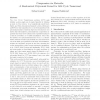Free Online Productivity Tools
i2Speak
i2Symbol
i2OCR
iTex2Img
iWeb2Print
iWeb2Shot
i2Type
iPdf2Split
iPdf2Merge
i2Bopomofo
i2Arabic
i2Style
i2Image
i2PDF
iLatex2Rtf
Sci2ools
130
click to vote
SODA
2012
ACM
2012
ACM
Compression via matroids: a randomized polynomial kernel for odd cycle transversal
The Odd Cycle Transversal problem (OCT) asks whether a given graph can be made bipartite by deleting at most k of its vertices. In a breakthrough result Reed, Smith, and Vetta (Operations Research Letters, 2004) gave a O(4k kmn) time algorithm for it, the first algorithm with polynomial runtime of uniform degree for every fixed k. It is known that this implies a polynomial-time compression algorithm that turns OCT instances into equivalent instances of size at most O(4k ), a so-called kernelization. Since then the existence of a polynomial kernel for OCT, i.e., a kernelization with size bounded polynomially in k, has turned into one of the main open questions in the study of kernelization. Despite the impressive progress in the area, including the recent development of lower bound techniques (Bodlaender et al., ICALP 2008; Fortnow and Santhanam, STOC 2008) and meta-results on kernelizations for graph problems on planar and other sparse graph classes (Bodlaender et al., FOCS 2009; Fo...
| Added | 28 Sep 2012 |
| Updated | 28 Sep 2012 |
| Type | Journal |
| Year | 2012 |
| Where | SODA |
| Authors | Stefan Kratsch, Magnus Wahlström |
Comments (0)

